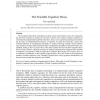Free Online Productivity Tools
i2Speak
i2Symbol
i2OCR
iTex2Img
iWeb2Print
iWeb2Shot
i2Type
iPdf2Split
iPdf2Merge
i2Bopomofo
i2Arabic
i2Style
i2Image
i2PDF
iLatex2Rtf
Sci2ools
118
click to vote
COGSCI
2008
2008
The Tractable Cognition Thesis
The recognition that human minds/brains are finite systems with limited resources for computation has led some researchers to advance the Tractable Cognition thesis: Human cognitive capacities are constrained by computational tractability. This thesis, if true, serves cognitive psychology by constraining the space of computational-level theories of cognition. To utilize this constraint, a precise and workable definition of "computational tractability" is needed. Following computer science tradition, many cognitive scientists and psychologists define computational tractability as polynomial-time computability, leading to the P-Cognition thesis. This article explains how and why the P-Cognition thesis may be overly restrictive, risking the exclusion of veridical computational-level theories from scientific investigation. An argument is made to replace the P-Cognition thesis by the FPT-Cognition thesis as an alternative formalization of the Tractable Cognition thesis (here, FPT...
Related Content
| Added | 09 Dec 2010 |
| Updated | 09 Dec 2010 |
| Type | Journal |
| Year | 2008 |
| Where | COGSCI |
| Authors | Iris van Rooij |
Comments (0)

